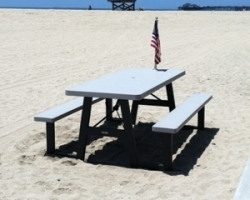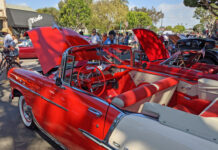Beach-front residents who have picnic tables, chairs and benches on the public beach will have until Dec. 1 to remove them. The city will remove any remaining furniture on the beach after the deadline.
Meanwhile, city staff will research the type of picnic tables that will ultimately replace them. Staff will also work on developing a permitting process similar to the memorial bench programs that allows citizens to buy trees or benches and place them at select locations.
Members of the public would be allowed to use the benches.
The issue is expected to come back to the council after Jan. 1, when staff has worked out details.
Jim Basham, director of Community Development, said at minimum the California Coastal Commission would probably require a coastal development permit to allow the encroachments. According to City Manager Jill Ingram, the answers city employees get from the Coastal Commission can depend on which staff member you speak with.
This week the City Council looked at the issue of private benches, picnic tables and now chairs on the public beach. The issue first came up when a citizen filed a complaint in 2013. Although the tables have a long history of being on the sand, the city code has never allowed them. But the code wasn’t enforced until 2013. “It’s like we can’t get rid of this,” said District Four Councilman Gary Miller, who represents College Park East. The tables are on the sand, which is council District One.
The staff report proposed four options for the council: take no action; have staff consult the Coastal Commission; remove all furniture from the beach; have staff come back with a budget item to put public benches on the beach.
Mayor Ellery Deaton, who represents the Old Town area, said she would like to take the tables off the beach for 30 days. She favored having the city own the benches to eliminate the personal liability issue. She asked staff to come up with a dedication process similar to the memorial bench program. The city currently allows residents to buy a bench or tree to memorialize someone. Staff has identified locations where the benches may be placed or trees may be planted. Miller praised the staff’s hard work, but said the staff had not addressed the issue of cleaning the area around the picnic tables.
Seal Way resident Joe Kalmick suggested aluminum or fiberglass tables as a response to concerns that any tables allowed on the beach be uniform. Deaton liked that idea. According to her, the tables could be easily moved, allowing clean up of the area, and would last longer than wooden tables.
During public comments, three city residents opposed allowing the picnic tables on the beach.
According to Michael Neimeyer, for example, there were now many tables, chairs and various lounges on the beach. He said he did not understand why the city code was not being enforced. He said he saw nothing in the staff report about the liability issue. According to Neimeyer, the city was not taking compliance with the Americans with Disabilities Act seriously. The ADA would require disabled citizens to be able to use the benches.
Three others spoke in favor of the tables. Others proposed compromises. Margene Walz said in 2013, there were 12 tables on the beach. Referring to a proposed permitting process recommended by the Recreation and Parks Commission in 2014, she said the application process would have required proof of residence and limited the number of benches to 20.












